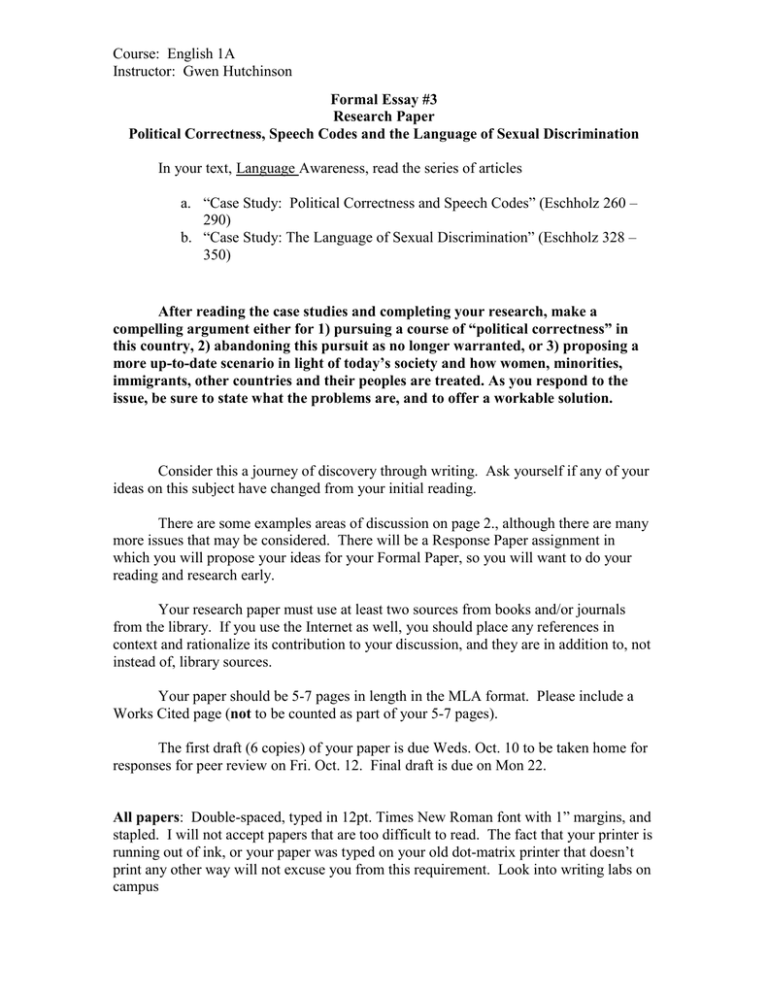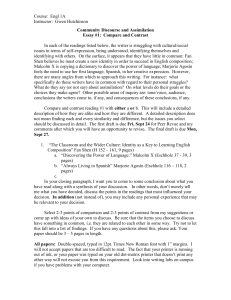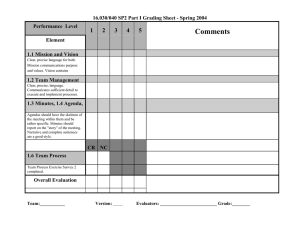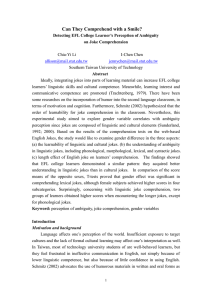
Course: English 1A
Instructor: Gwen Hutchinson
Formal Essay #3
Research Paper
Political Correctness, Speech Codes and the Language of Sexual Discrimination
In your text, Language Awareness, read the series of articles
a. “Case Study: Political Correctness and Speech Codes” (Eschholz 260 –
290)
b. “Case Study: The Language of Sexual Discrimination” (Eschholz 328 –
350)
After reading the case studies and completing your research, make a
compelling argument either for 1) pursuing a course of “political correctness” in
this country, 2) abandoning this pursuit as no longer warranted, or 3) proposing a
more up-to-date scenario in light of today’s society and how women, minorities,
immigrants, other countries and their peoples are treated. As you respond to the
issue, be sure to state what the problems are, and to offer a workable solution.
Consider this a journey of discovery through writing. Ask yourself if any of your
ideas on this subject have changed from your initial reading.
There are some examples areas of discussion on page 2., although there are many
more issues that may be considered. There will be a Response Paper assignment in
which you will propose your ideas for your Formal Paper, so you will want to do your
reading and research early.
Your research paper must use at least two sources from books and/or journals
from the library. If you use the Internet as well, you should place any references in
context and rationalize its contribution to your discussion, and they are in addition to, not
instead of, library sources.
Your paper should be 5-7 pages in length in the MLA format. Please include a
Works Cited page (not to be counted as part of your 5-7 pages).
The first draft (6 copies) of your paper is due Weds. Oct. 10 to be taken home for
responses for peer review on Fri. Oct. 12. Final draft is due on Mon 22.
All papers: Double-spaced, typed in 12pt. Times New Roman font with 1” margins, and
stapled. I will not accept papers that are too difficult to read. The fact that your printer is
running out of ink, or your paper was typed on your old dot-matrix printer that doesn’t
print any other way will not excuse you from this requirement. Look into writing labs on
campus
Some examples:
1.
Make your arguments in terms of ethos, pathos and logos. Refer to the
two handouts on Persuasion for clarification. You can use these as
secondary sources of support for your discussion, although not as a
replacement for books and/or journals.
2.
Schools, or workplaces often have official speech codes, dress codes,
or some other codes governing behavior, what is the purpose of such
codes. Should they be strictly enforced or eliminated. Does your
opinion change depending on the code in question?
3.
Are the reports of “excesses” of those interested in promoting political
correctness important for us to know? Do such reports of those
excesses distort or give important insights into what’s actually
happening with respect to the rights of all individuals in our society?
4.
The political correctness movement has taken a good idea and pushed
it too far, or there is an ongoing need to monitor our language.
5.
What is the history of the term politically correct? When was it first
used, by whom, and with what meaning? Has the meaning of the term
changed over time? What is the status of the term today? Should we
be taking it seriously today?
6.
Gender isn’t simply innate or biological, the argument goes; it’s as
much how you act as what you are.
7.
What are the historical reasons given for the need for speech codes?
Do you think speech codes have, in fact, served a worthwhile purpose?
Or, as their detractors claim, have speech codes silenced a segment of
American society? Do you believe there is still a need to maintain
speech codes?
How do you respond when you hear a joke based on racial or ethnic
stereotypes? Do you feel uncomfortable telling or hearing such jokes?
Do you think some are too sensitive about such jokes? Are you afraid
to speak out if you hear jokes and racially based stories? Should you
remind the joke teller that what he or she is doing is not in anyone’s
best interests? Are you engaging in a politically correct activity if you
make someone account for such joke telling?
8.
.






